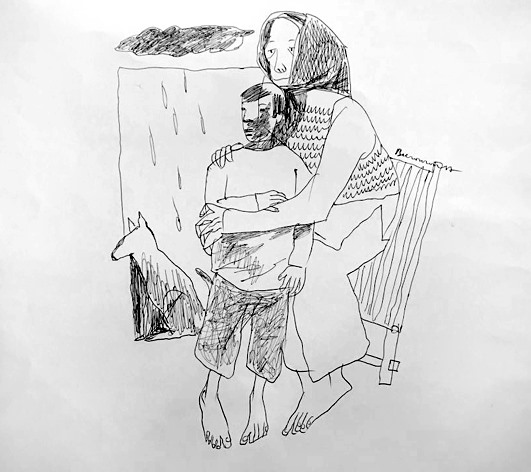

A short story by Vũ Thị Huyền Trang
 |
by Vũ Thị Huyền Trang
The weather in March was quite unpredictable. Out of the blue, it began raining with a cold wind on a previously calm day. An old woman was looking for a pair of pants for her grandson. This weather was a cold snap and she felt her joints ache.
The rice fields were submerged in water. All the farm work had to be put on hold. Her daughter-in-law Nhài was sitting still, her eyes fixed on the pitch black sky. She wondered what her daughter-in-law was thinking. Nhài’s eyes were unblinking, staring into the wilderness. Eventually, she stood up and walked into the darkness, ignoring her boy’s crying and the old woman’s calls.
She disappeared amid the vast fields and hills. No one followed her. The old woman couldn’t see why her daughter-in-law had left. She tried to stand up. It was dark and the firewood was wet. She tried to build a fire. Her grandson Du was playing on the verandah. With his mother gone, he had nobody to play with except a puppy.
Nobody called him by name, everyone called him “A….A….”. He said “a….a…” when he was hungry, when he was sick or when he was angry. It was difficult to tell what he wanted. He was both deaf and dumb. At seven, he was not allowed to join his primary school class because the teacher didn’t want him. Having him in the class frightened his classmates because he was always on the move, attacking his schoolmates. He bit, kicked and punched them. He paid no heed to the teachers’ threats or lessons. The school wanted to return him to his family so that he could be sent to a school of deaf and dumb children. But in this poor mountainous hamlet, there was no school the old woman could send him to. She was greatly disappointed and pitied herself. She brought this problem up to the local authorities, who brought the boy back to school, in spite of protests from other parents.
******
The boy did not have any friends, except for the puppy. The old woman had tried to sell the dog, but it was so pale and thin no one wanted it. She worked in the field every day, leaving the boy at home with the dog. Whenever the boy mumbled something, the puppy seemed to understand him. The boy hit the puppy sometimes and it would limp away to hide from him for a while. But, later the boy and the animal would sleep together in the kitchen or play under the star apple tree. The dog had a skin disease and was losing its hair. At noon, the old woman bathed the animal and asked the boy to rub ointment on it. Day by day, the dog healed. The boy sometimes spared half of a bowl of rice for the dog. When the boy went to school, the puppy lay under the tree, waiting for him. If the animal saw anyone hitting the boy, it would rush to his aid.
In the afternoons, the boy stayed at home and played with the puppy. The boy had no time to miss his mother. His love for the puppy grew ever greater as they were together all the time. The old woman sometimes thought about Nhài. Her daughter-in-law had been resigned to a miserable fate when the boy was born and her husband left her. She had been depressed. The old woman sometimes reproached her daughter-in-law for giving birth to the boy; sometimes she expressed pity for her. The old woman had conflicted feelings. Sometimes she was warm, other times cruel. She often asked herself: “Why did I treat Nhài like that?”
The old woman’s only child was her son Núi. Her husband died and she was left alone to raise him. She devoted all her love to him. This love gradually made her a domineering figure. When her son married Nhài, she felt she was losing him and deep inside her heart, she hated Nhài. And then the deaf and dumb boy was born and her son Núi left without a trace; her whole life had collapsed. She was devastated and vented all her miseries upon her daughter-in-law. Life became unbearable for Nhài. So, she left.
The boy called “A….A….” had grown up in that hot mess. He played with the puppy, his only friend in this world, and the dog played with the boy with all of its joy. Since Núi had left, the old woman began to love her poor grandson. Yet, did she love him completely? Had she ever embraced the boy? Had she ever rocked him to sleep? He had sometimes suffered greatly. Many nights he woke up sobbing and the puppy woke up with him. It used its two front legs to caress him. One night the boy had a high temperature and the old woman did not know the puppy would draw close to him, licking his face.
******
The boy became gentler after befriending the puppy. He was better with his classmates. They weren’t frightened of him anymore. He mingled with friends, playing happily with them. The boy was content in the knowledge that his friend, the puppy, was waiting for him to return from school. On the way home, the puppy would run to greet the boy. The old woman worried about what would happen to the boy when he grew up and the puppy was still his only friend. She was old and weak, and the boy needed someone to live with.
The old woman sat down, feeling exhausted. She looked at the boy sitting all alone. If adults learned to love each other, to share things with each other, the boy would be less lonely. If she had been less cruel to her daughter-in-law, she would not be lonely now too. She felt great pity for the boy as the silent evening fell. She watched him playing with his puppy and felt less lonely. She was still thinking hard when the puppy ran into the house, wagging its tail. It seemed that the dog was trying to tell the boy something. Then she heard some familiar steps outside. Nhài was home. In her bag, there were toys and new clothes for her son. She had even brought medicine for her mother-in-law’s rheumatism. Nhài put down the bag, rushing to embrace her son, sobbing with joy. The boy turned back gradually and ran toward his mother, speaking “a….a….”. The old woman felt her eyes well up with tears, so she ran to the kitchen to wipe them away. The puppy witnessed that happy reunion. It was curled up on a pile of dried banana leaves, looking at the boy who was trying his new clothes on…./.
Translated by Mạnh Chương









